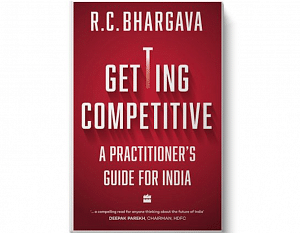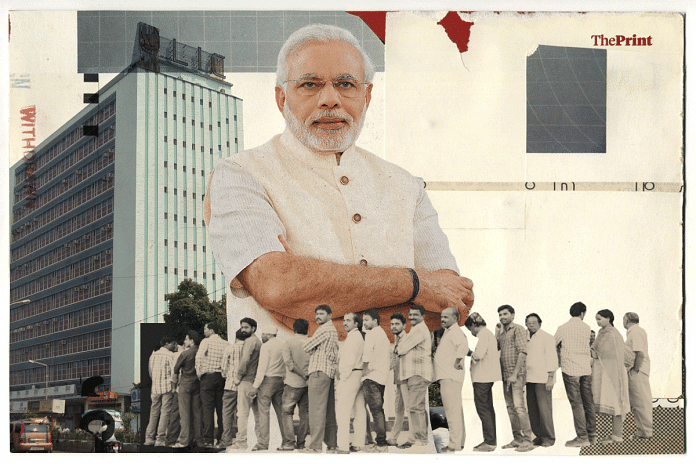The laws and regulations for private industry up to 1991 greatly shaped the thinking, behaviour and mindsets of leaders of private sector industry. Except for a very few of them, the thought of growing into large global-sized companies never entered their minds. They did not understand competitiveness, and with some justification believed that manufactured products in India could not compete with imports due to much higher costs in India. There was no trust or confidence in the state’s willingness to facilitate industrial competitiveness, and the question of working together did not arise.
The political system had to be managed and private industrialists had to keep on the ‘right’ side of the system.
After 1991, many of the earlier shackles binding the private sector were removed. However, the state did not become a facilitator of private sector industrial growth. The distrust between industrialists, politicians and bureaucrats did not give way to trust. The state did not make it easier to do business or create conditions which would enable private sector industry to become competitive. The thinking and mindsets of private industry leaders, again with a few exceptions, remained negative as far as becoming competitive and growing to global size was concerned.
Also read: Why India’s small, retail investors are making a beeline for beaten-down stocks
Modi enunciated his policy regarding the importance of accelerating the growth of manufacturing industry in India so as to create wealth and employment opportunities for the growing young population.
The reliance on the public sector to industrialize India is no longer in existence. A larger divestment programme is being implemented but political compulsions, including opposition from some political parties, is holding back faster privatization.
It was in 2014 that the new prime minister clearly enunciated his policy regarding the importance of accelerating the growth of manufacturing industry in India so as to create wealth and employment opportunities for the growing young population. The role and importance of the private sector has been highlighted by the government on several occasions. The reliance on the public sector to industrialize India is no longer in existence. A larger divestment programme is being implemented but political compulsions, including opposition from some political parties, is holding back faster privatization.
The ‘ease of doing business’ policy is essentially focusing on making it easier for the private sector and foreign investors to make investments in manufacturing and industrial activities in India. The ‘Make in India’ programme is also clearly relying on the private sector and the foreign investors to boost domestic manufacturing and job creation.
Undoubtedly, many industrial leaders are aware that there are large opportunities for Indian industry to grow rapidly. The Indian domestic market is largely underdeveloped for most manufactured products. A good example is the car industry. Despite the low priority assigned to car production during the earlier days, and the high taxation on them even presently, India has become the fourth largest manufacturer of cars in the world. The penetration of cars is still only about 28 per thousand against 150 per thousand in China. The potential for growth of car sales in the domestic market is obvious. India is also exporting about 750,000 cars a year. The technological and engineering skills available in India and the demonstrated capability of the workforce here to make high- quality cars at competitive costs will lead to exports growing in the future, especially to the developing markets including Africa. Faster growth of car production will give a big push to manufacturing and employment creation.
Also read: India’s animal spirits in deep slumber despite resumption of economic activity
The situation regarding the car industry applies to most areas of manufacturing. The domestic market has a large potential that can lead to high growth provided state policies besides facilitating competitive manufacturing also focus on creating demand. Economies of scale would also lead to the ability to export in large volumes. Human resources will not be a constraint in the foreseeable future, given the demography of India. For many foreign investors rule of law, protection of intellectual property rights in India, and tax reforms would be major incentives to invest in this country. India Inc. needs to be created with industry and state working in harmony and with trust in each other.
Prime Minister Modi is not only emphasizing the importance of rapid manufacturing growth but for the first time is trusting the private sector to lead the industrialization of India. This has created opportunities for the private sector to become global-sized players. Entrepreneurs and industry leaders should recognize the change that has taken place and do everything possible to make up for the lack of growth in the past. They must adjust their thinking and actions so that they can manage their enterprises in a manner that leads to the required results.
It is important to recognize that the present system of managing industry is similar to what prevails in the US and some other Western countries. Indian industry needs to ask itself as to whether, in the present political and social environment, the existing management system would enable them to become globally competitive. In many Western countries, especially the US, much of manufacturing has lost competitiveness, and products made in the Eastern countries have captured a large share of their market.
In India, while in the past state policies have not facilitated private sector industrial growth, the management system in use by Indian industry has also not resulted in manufacturing becoming competitive. In the context of the challenge of quickly accelerating manufacturing growth, there is a need to review the management system especially with an eye on the more successful management style in Japan. I do not mention countries like Korea or China because the Japanese political system is much more similar to that in India.
Maruti Suzuki India was able to meet and exceed all its targets right from its start in 1981. It adapted the existing management practices in India to modify and incorporate those Japanese practices that would lead to greater competitiveness of manufacturing. The decision to do so was because it was realized that existing Indian ways of managements did not lead to competitive levels of quality or cost. The Japanese had shown how effective their system was in overcoming what would normally appear to be insurmountable obstacles to competitiveness. However, introducing Japanese systems did require the top management to change not only some of the accepted ways of behaviour but also concepts of status, privileges and benefits.
In the socialist era, private industry was not required to play any important part in making India an industrialized and economically powerful country. After 1991, while the role of the private sector became larger, political leaders did not publicly say that this sector was mainly responsible for the industrial development of India. The situation changed significantly after 2014, and ministers have stated that industrial competitiveness and growth has to be driven by the private sector. Private sector leaders of industry are being asked to shoulder the responsibility of becoming significant contributors to nation building.
Private sector industry has to deliver as the country cannot afford another failure to industrialize. Unemployment would grow to unmanageable levels and democracy and the rule of law would get seriously endangered. It is obvious that it is very much in the interests of the leaders of private sector that this does not happen. To ensure success, leaders must carefully examine the national environment and make such changes as would enable them to win the trust of the people, create India Inc. and make the country a vibrant and strong industrial economy.
It is necessary that the private sector quickly forgets the way it functioned during the period up to 1991. The practices of manufacturing in a seller’s market have to be replaced by those that will bring success in the competitive Indian market and will enable industry to sell in the global markets. The focus now has to shift to continuous improvements in technology, quality, cost and customer care. In addition, the ethics and integrity of industrial leaders should become such as to command universal respect. That will not only lead to building strongly motivated teams in their undertakings but also to creating a strong India Inc.
 This excerpt from the book Getting Competitive has been published with permission from Harper Collins.
This excerpt from the book Getting Competitive has been published with permission from Harper Collins.
It will be released on 5 July on SoftCover, ThePrint’s new e-venue to launch select non-fiction books.
Also read: Why Indian companies are watching how successful this data firm is in getting a dollar loan



